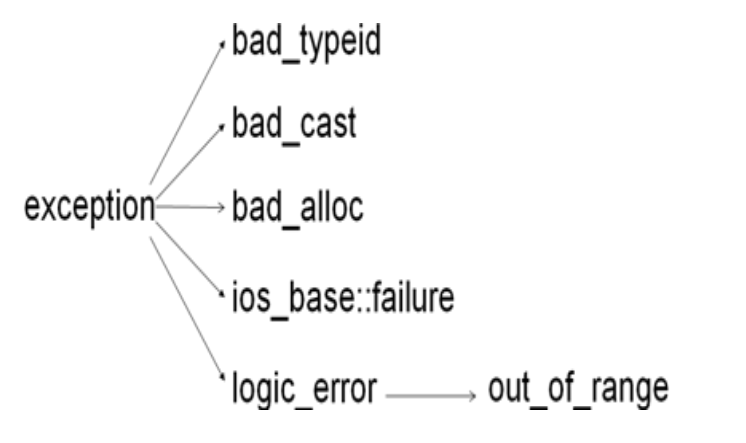用try、catch处理异常
#include <iostream>using namespace std;int main() {double m, n;cin >> m >> n;try {cout << "before dividing." << endl;if(n == 0)throw -1; // 抛出int类型异常elsecout << m / n << endl;cout << "after dividing." << endl;} catch (double d) {cout << "catch(double)" << endl;} catch(int e) {cout << "catch(int)" << endl;}cout << "finished." << endl;}/************* 输入9 6************** 输出before dividing.1.5after dividing.finished.**************/
- 在
try块中一旦抛出异常,下面的语句不再执行 如果
try中没有抛出异常,则一个catch也不会执行- 就算抛出异常,但是
catch捕获的类型不匹配,也不会执行 -
… 捕获任何异常
#include <iostream>using namespace std;int main() {double m, n;cin >> m >> n;try {cout << "before dividing." << endl;if(n == 0)throw -1; // 抛出int类型异常else if (m == 0)throw -1.0; // 抛出double类型异常elsecout << m / n << endl;cout << "after dividing." << endl;} catch (double d) {cout << "catch(double)" << d << endl;} catch(...) { // 捕获任何类型异常cout << "catch(...)" << endl;}cout << "finished." << endl;}/************* 输入9 00 6************** 输出before dividing.catch(...)finished.before dividing.catch(double)-1finished**************/
异常再抛出
如果一个函数在执行的过程中,抛出的异常在本函数内就被
catch块捕获并处理了,那么该异常就不会抛给这个函数的调用者(也称“上一层的函数” );如果异常在本函数中没被处理,就会被抛给上一层的函数#include <iostream>#include <string>using namespace std;class CException {public:string msg;CException(string s):msg(s){}};double Divide(double x, double y) {if(y == 0)throw CException("divided by zero");cout << "in Divide" << endl;return x / y;}int CountTax(int salary) {try {if(salart < 0)throw -1;cout << "counting tax" << endl;} catch(int) {cout << "salary < 0" << endl;}cout << "tax counted" << endl;return salary * 0.15;}int main() {double f = 1.2;try {CountTax(-1);f = Divide(3, 0); // 没有修改f的值cout << "end of try block" << endl;}catch(CException e) {cout << e.msg << endl;}cout << "f=" << f << endl;cout << "finished" << endl;return 0;}/************** 输出salary < 0tax counteddiveded by zerof=1.2finished**************/
C++标准异常类
bad_cast
在用
dynamic_cast进行从多态基类对象(或引用) ,到派生类的引用的强制类型转换时,如果转换是不安全的,则会抛出此异常#include <iostream>#include <stdexcept>#include <typeinfo>using namespace std;class Base{virtual void func(){}};class Derived : public Base{public:void Print() { }};void PrintObj(Base & b) {try {Derived & rd = dynamic_cast<Derived &>(b);// 此转换若不安全,会抛出bad_cast异常rd.Print();} catch(bad_cast& e) {cout << e.what() << endl;}}int main() {Base b;PrintObj(b);reutnr 0;}// 输出 Bad dynamic_cast
bad_alloc
在用
new运算符进行动态内存分配时,如果没有足够的内存,则会引发此异常#include <iostream>#include <stdexcept>using namespace std;int main() {try {char * p = new char[0x7ffffff]; // 无法分配这么多空间,会抛出异常} catch (bad_alloc& e) {cout << e.what() << endl;}return 0;}// 输出 bad allocation
- 就算抛出异常,但是
out_of_range
用 vector 或 string 的 at 成员函数根据下标访问元素时,如果下标越界,就会抛出此异常
#include <iostream>#include <stdexcept>#include <string>#include <vector>int main() {vector<int> v(10);try {v.at(100) = 100; // 抛出异常} catch(out_of_range& e) {cerr << e.what() << endl;}string s = "Hello";try {char c = s.at(100); // 抛出异常} catch(out_of_range& e) {cerr << e.what() << endl;}return 0;}/***************** 输出invalid vector<T< subscriptinvalid string position******************/



